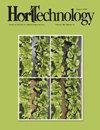高隧道嫁接有机番茄生产的经济分析
IF 1.3
4区 农林科学
Q3 HORTICULTURE
引用次数: 0
摘要
随着甲基溴因其对臭氧消耗的影响而逐步淘汰,以及在有机蔬菜生产中转向更受保护的栽培系统,嫁接做法在美国受到了更多的关注,因为它可能被认为是有机蔬菜生产的一种可行的疾病控制方法。然而,缺乏关于在受保护的培养系统(如高隧道系统)中使用嫁接生产有机番茄(茄属番茄)的经济可行性的信息。利用在佛罗里达州Citra收集的2年现场试验数据,我们检验了在高隧道中使用嫁接对有机番茄生产经济回报的影响。我们的分析表明,在高通道中,嫁接往往会提高有机番茄生产的市场产量。然而,产量的提高并不一定会增加净回报,这取决于市场条件和移植器官的相对性能。此外,我们的研究结果表明,嫁接生产的净收益对番茄售价高度敏感。获得价格溢价对于提高高隧道中嫁接有机番茄生产的盈利能力至关重要。本文章由计算机程序翻译,如有差异,请以英文原文为准。
Economic Analysis of Grafting Organic Tomato Production in High Tunnels
With the phase-out of methyl bromide because of its impact on ozone depletion and the shift to a more protected culture system in organic vegetable production, grafting practice has gained greater attention in the United States because it may be considered a viable disease control method in organic vegetable production. However, there is a lack of information on the economic feasibility of using grafting in organic tomato (Solanum lycopersicum) production in a protected culture system such as a high-tunnel system. Using 2-year on-station trial data collected in Citra, FL, we examined the effect of using grafting on the economic returns of organic tomato production in high tunnels. Our analysis suggests that grafting tends to increase the marketable yield of organic tomato production in high tunnels. However, the enhanced yield does not necessarily increase the net return, depending on market conditions and the relative performance of grafted transplants. In addition, our results indicate that the net return of grafted production is highly sensitive to the tomato selling price. Obtaining a price premium is essential for increasing the profitability of grafted organic tomato production in high tunnels.
求助全文
通过发布文献求助,成功后即可免费获取论文全文。
去求助
来源期刊

Horttechnology
农林科学-园艺
CiteScore
2.30
自引率
10.00%
发文量
67
审稿时长
3 months
期刊介绍:
HortTechnology serves as the primary outreach publication of the American Society for Horticultural Science. Its mission is to provide science-based information to professional horticulturists, practitioners, and educators; promote and encourage an interchange of ideas among scientists, educators, and professionals working in horticulture; and provide an opportunity for peer review of practical horticultural information.
 求助内容:
求助内容: 应助结果提醒方式:
应助结果提醒方式:


